

E-Books → The Great Naval Game Britain and Germany in the Age of Empire
Published by: voska89 on 16-08-2022, 16:48 |  0
0
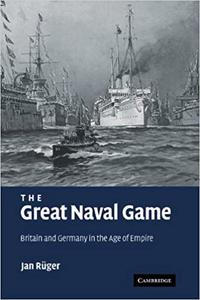
Jan Rüger, "The Great Naval Game: Britain and Germany in the Age of Empire "
English | ISBN: 0521875765 | 2007 | 356 pages | PDF | 13 MB
This book is about the theatre of power and identity that unfolded in and between Britain and Germany in the decades before the First World War. It explores what contemporaries described as the cult of the navy: the many ways in which the navy and the sea were celebrated in the fleet reviews, naval visits and ship launches that were watched by hundreds of thousands of spectators. At once royal rituals and national entertainments, these were events at which tradition, power and claims to the sea were played out between the nations. This was a public stage on which the domestic and the foreign intersected and where the modern mass market of media and consumerism collided with politics and international relations. Conflict and identity were literally acted out between the two countries. By focusing on this dynamic arena, Jan Rüger offers a fascinating new history of the Anglo-German antagonism.
E-Books → AT THE FALL OF NAZI GERMANY - PREVIOUSLY UNPUBLISHED IMAGES
Published by: voska89 on 13-08-2022, 01:18 |  0
0
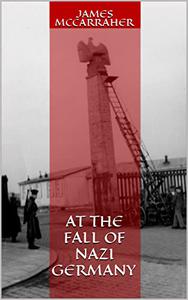
AT THE FALL OF NAZI GERMANY - PREVIOUSLY UNPUBLISHED IMAGES by James McCarraher, David McCarraher, Richard Coombs
English | October 12, 2021 | ISBN: N/A | ASIN: B09JDXGQ1S | 100 pages | EPUB | 7.96 Mb
THIS IS PREDOMINANTLY A PHOTOGRAPHIC BOOK.
E-Books → Nazi Germany's Conquest of Western Europe
Published by: voska89 on 5-08-2022, 20:42 |  0
0
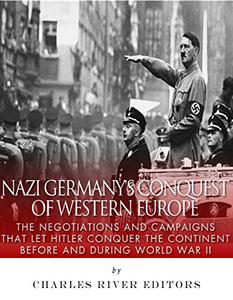
Nazi Germany's Conquest of Western Europe: The Negotiations and Campaigns that Let Hitler Conquer the Continent Before and During World War II by Charles River Editors
English | July 3, 2015 | ISBN: 1514792613 | 160 pages | EPUB | 4.91 Mb
*Includes pictures *Includes accounts of the negotiations and fighting *Includes online resources and a bibliography for further reading *Includes a table of contents One of the most famous people in the world came to tour the city of Paris for the first time on June 28, 1940. Over the next three hours, he rode through the city's streets, stopping to tour L'Opéra Paris. He rode down the Champs-Élysées toward the Trocadero and the Eiffel Tower, where he had his picture taken. After passing through the Arc de Triomphe, he toured the Pantheon and old medieval churches, though he did not manage to see the Louvre or the Palace of Justice. Heading back to the airport, he told his staff, "It was the dream of my life to be permitted to see Paris. I cannot say how happy I am to have that dream fulfilled today." Four years after his tour, Adolf Hitler would order the city's garrison commander, General Dietrich von Choltitz, to destroy Paris, warning his subordinate that the city "must not fall into the enemy's hand except lying in complete debris." The fact that Hitler set foot in Paris in June 1940 was remarkable in its own right and the culmination of Nazi Germany's lightning advance across most of Western Europe, beginning even before the war with the annexations of lands, some of which was made possible by the now widely reviled Munich agreement. Other negotiations with the Soviet Union allowed Germany to invade Poland with few consequences in September 1939, and the military superiority built up over the two decades between the world wars made it possible for the Germans to push aside their opponents when they found them. Of course, Paris was not destroyed before the Allies liberated it, but it would take more than 4 years for them to wrest control of France from Nazi Germany after they took the country by storm in about a month in 1940. That said, it's widely overlooked today given how history played out that as the power of Nazi Germany grew alarmingly during the 1930s, the French sought means to defend their territory against the rising menace of the Thousand-Year Reich. As architects of the most punitive measures in the Treaty of Versailles following World War I, France was a natural target for Teutonic retribution, so the Maginot Line, a series of interconnected strongpoints and fortifications running along much of France's eastern border, helped allay French fears of invasion. The true flaw in French military strategy during the opening days of World War II lay not in reliance on the Maginot fortifications but in the army's neglect to exploit the military opportunities the Line created. In other words, the border defense performed as envisioned, but the other military arms supported it insufficiently to halt the Germans. The French Army squandered the opportunity not because the Maginot Line existed but because they failed to utilize their own defensive plan properly; the biggest problem was that the Germans simply skirted past the intricate defensive fortifications by invading neutral Belgium and swinging south, thereby avoiding the Maginot Line for the most part. Nazi Germany's Conquest of Western Europe: The Negotiations and Campaigns that Let Hitler Conquer the Continent Before and During World War II chronicles the background leading up to World War II and Germany's quick success in the first year of it. Along with pictures of important people, places, and events, you will learn about Nazi Germany's conquest of Western Europe like never before, in no time at all.
E-Books → The Fall of France The History of Nazi Germany's Invasion and Conquest of France During World War II
Published by: voska89 on 5-08-2022, 01:36 |  0
0
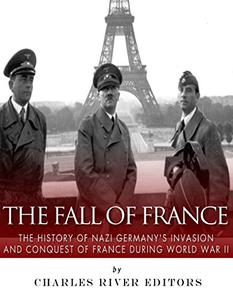
The Fall of France: The History of Nazi Germany's Invasion and Conquest of France During World War II by Charles River Editors
English | July 2, 2015 | ISBN: 151478856X | 115 pages | EPUB | 1.99 Mb
*Includes pictures *Includes accounts of the fighting *Includes online resources and a bibliography for further reading *Includes a table of contents "My Luftwaffe is invincible...And so now we turn to England. How long will this one last - two, three weeks?" - Hermann Goering, June 1940 One of the most famous people in the world came to tour the city of Paris for the first time on June 28, 1940. Over the next three hours, he rode through the city's streets, stopping to tour L'Opéra Paris. He rode down the Champs-Élysées toward the Trocadero and the Eiffel Tower, where he had his picture taken. After passing through the Arc de Triomphe, he toured the Pantheon and old medieval churches, though he did not manage to see the Louvre or the Palace of Justice. Heading back to the airport, he told his staff, "It was the dream of my life to be permitted to see Paris. I cannot say how happy I am to have that dream fulfilled today." Four years after his tour, Adolf Hitler would order the city's garrison commander, General Dietrich von Choltitz, to destroy Paris, warning his subordinate that the city "must not fall into the enemy's hand except lying in complete debris." Of course, Paris was not destroyed before the Allies liberated it, but it would take more than 4 years for them to wrest control of France from Nazi Germany after they took the country by storm in about a month in 1940. That said, it's widely overlooked today given how history played out that as the power of Nazi Germany grew alarmingly during the 1930s, the French sought means to defend their territory against the rising menace of the Thousand-Year Reich. As architects of the most punitive measures in the Treaty of Versailles following World War I, France was a natural target for Teutonic retribution, so the Maginot Line, a series of interconnected strongpoints and fortifications running along much of France's eastern border, helped allay French fears of invasion. The true flaw in French military strategy during the opening days of World War II lay not in reliance on the Maginot fortifications but in the army's neglect to exploit the military opportunities the Line created. In other words, the border defense performed as envisioned, but the other military arms supported it insufficiently to halt the Germans. The French Army squandered the opportunity not because the Maginot Line existed but because they failed to utilize their own defensive plan properly; the biggest problem was that the Germans simply skirted past the intricate defensive fortifications by invading neutral Belgium and swinging south, thereby avoiding the Maginot Line for the most part. The French had not expected the Germans would be able to move armored units through the Ardennes Forests, a heavily wooded region spanning parts of Belgium, France and the Netherlands. To the Allies' great surprise, the Germans had no trouble rolling across these lands in the span of weeks. And by invading France from the north, the Germans simply avoided the Maginot Line. The French surrendered in June 1940, and the British narrowly escaped disaster by transporting thousands of soldiers and equipment across the English Channel at Dunkirk. Thus, by the middle of 1940, the Axis powers and the Soviet Union had overrun nearly all of Western Europe. With France out of the war, and without active participation by the United States, Great Britain virtually stood alone. The Fall of France: The History of Nazi Germany's Invasion and Conquest of France During World War II chronicles the background and construction of the much maligned defensive fortifications. Along with pictures of important people, places, and events, you will learn about the fall of France like never before, in no time at all.
E-Books → NAPOLEON'S LAST CAMPAIGN IN GERMANY
Published by: voska89 on 2-08-2022, 18:38 |  0
0
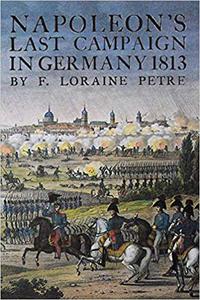
Loraine Petre, "NAPOLEON'S LAST CAMPAIGN IN GERMANY"
English | ISBN: 1783311703 | 2015 | 428 pages | EPUB | 4 MB
Loraine Petre is widely recognised as the father of Napoleonic Wars history writing. In this volume on the Emperor's last campaign in Germany - the scene of so many of his previous triumphs - Petre pictures Bonaparte at bay, with his Grande Armee decimated by the disastrous retreat from Moscow. Napoleon was fighting off overwhelming odds in a series of battles at Saale, Lutzen, Bautzen, Dresden, Dennewitz - culminating at the great 'Battle of the Nations' at Leipzig when he faced a massive defeat which propelled him along the road back to Paris and abdication.
E-Books → Greater Than a Tourist - Hamburg Germany 50 Travel Tips from a Local
Published by: voska89 on 2-08-2022, 17:59 |  0
0

Greater Than a Tourist - Hamburg Germany: 50 Travel Tips from a Local by Greater Than a Tourist
English | June 30, 2017 | ISBN: 1521725365 | 99 pages | EPUB | 0.18 Mb
Are you excited about planning your next trip? Do you want to try something new while traveling? Would you like some guidance from a local? If you answered yes to any of these questions, then this book is just for you. Greater Than a Tourist- Hamburg, Germany by Nicola Coutinho offers the inside scope on Hamburg. Most travel books tell you how to travel like a tourist. Although there's nothing wrong with that, as a part of the Greater than a Tourist series, this book will give you travel tips from someone who lives at your next travel destination. In these pages you'll discover local advice that will help you throughout your stay. This book will not tell you exact addresses or store hours but instead will give you an excitement and knowledge from a local that you may not find in other smaller print travel books. Travel like a local. Slow down, stay in one place, and get to know the people and the culture of a place.
E-Books → Comparing Police Corruption Bulgaria, Germany, Russia and Singapore
Published by: voska89 on 31-07-2022, 20:59 |  0
0

Leslie Holmes, "Comparing Police Corruption: Bulgaria, Germany, Russia and Singapore "
English | ISBN: 0367742705 | 2021 | 218 pages | EPUB | 1156 KB
This book analyses police corruption across four country case studies, exploring how the problem manifests in each country and how it can be reduced.
E-Books → Fodor's Essential Germany, 2nd Edition
Published by: voska89 on 27-07-2022, 15:14 |  0
0

Fodor's Essential Germany, 2nd Edition by Fodor's
English | July 26, 2022 | ISBN: 1640975098 | True EPUB | 784 pages | 189 MB
Whether you want to take a boat down the Rhine, go to Oktoberfest in Munich, or explore the Black Forest, the local Fodor's travel experts in Germany are here to help! Fodor's Essential Germany guidebook is packed with maps, carefully curated recommendations, and everything else you need to simplify your trip-planning process and make the most of your time. This new edition has been fully-redesigned with an easy-to-read layout, fresh information, and beautiful color photos. Fodor's "Essential" guides have been named by Booklist as the Best Travel Guide Series of 2020!
E-Books → Medieval Germany An Encyclopedia (Routledge Revivals)
Published by: voska89 on 26-07-2022, 20:14 |  0
0

Medieval Germany : An Encyclopedia (Routledge Revivals)
by John M. Jeep
English | 2016 by Routledge | ISBN: 1138062723 | 969 Pages | True PDF | 45 MB
E-Books → Germany After the 2013 Elections Breaking the Mould of Post-Unification Politics
Published by: voska89 on 24-07-2022, 22:26 |  0
0

Gabriele D'Ottavio, "Germany After the 2013 Elections: Breaking the Mould of Post-Unification Politics?"
English | ISBN: 1472444396 | 2015 | 248 pages | EPUB | 3 MB
The German election of 2013 has important ramifications for the whole of Europe. Germany After the 2013 Elections: Breaking the Mould of Post-Unification Politics? provides a comprehensive analysis of this election and its wider implications for post-unification German politics. International specialists on German and EU politics examine the domestic and international context of the election and reflect on its possible consequences. In the first part of the volume, a number of contributors analyse the policy environment in which the election took place while the second part deals with voters, parties and leaders' strategies in the run-up to, and the aftermath, of the 2013 election.



